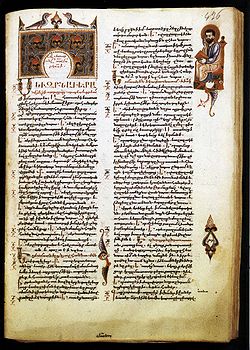nem,
ezt nem egy magyar politikus, nem bevándorlás témában, és nem most
mondta. nem tudod, melyik szó hiányzik kétszer is?... ha láttad a
nyelvtani segítséget, akkor nem nehéz
a fordítás, ha nem, akkor
igen.
segítség a nyelvtanhoz:
* vagy... vagy, sem... sem..._mondatok
Wikipedia: A gospel is an account describing the life, death, and resurrection of Jesus of Nazareth. The most widely known examples are the four canonical gospels of Matthew, Mark, Luke, and John which are included in the New Testament, but the term can also used to refer to apocryphal, non-canonical, Jewish–Christian and gnostic gospels.
The first page of the Gospel of Mark inArmenian, by Sargis Pitsak, 14th century.
Etymology
The word gospel derives from the Old English gōd-spell (rarely godspel), meaning "good news" or "glad tidings", and is a calque (word-for-word translation) of the Greek word εὐαγγέλιον, euangelion (eu- "good", -angelion "message") or in Aramaic ewang'eliyawn). The gospel was considered the "good news" of the coming Kingdom of Messiah, and of redemption through the life and death and resurrection of Jesus, the central Christian message. The Greek word euangelion is also the source (via Latinised evangelium) of the terms "evangelist" and "evangelism" in English. The authors of the four canonical Christian gospels are known as the Four Evangelists.
Islamic view
The Injil (Arabic: إنجيل) is the Arabic name for what Muslims believe to be the original gospel of Jesus. This Injil is one of the Islamic Holy Books the Qur'an records as revealed by God, the others being the Scrolls of Abraham, the Scrolls of Moses, the Tawrat (the Torah), the Zabur (the Psalms), and the Qur'an.


Nincsenek megjegyzések :
Megjegyzés küldése